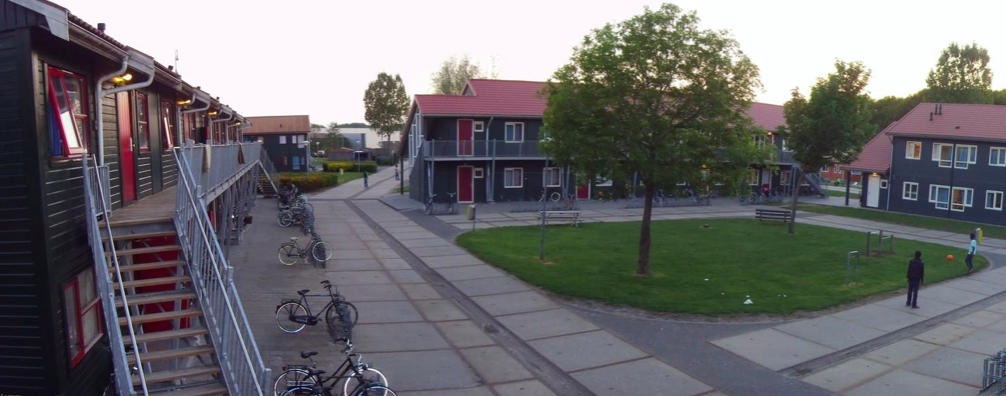Asylum seeker centres in the Netherlands are completely full, according to a statement released by the Central Agency for the Reception of Asylum Seekers (COA) today, reports nu.nl.
The number of asylum seekers currently staying in centres across the Netherlands is nearly 27,000. This is just under the number who were staying there in 2016, when the Netherlands was dealing with the aftermath of the refugee crisis.
The number of new asylum seekers is not the problem
The reasons for the current overcrowding of asylum seeker centres are complicated: it isn’t just because there are more asylum seekers arriving in the Netherlands (there are, but not by much). It’s also because of the housing shortage: many status holders haven’t been able to find housing, so they’re forced to stay in the centres longer than would be ideal. Finally, those who are processing asylum seeker applications need more time, more money, and more staff for the process to run as efficiently as it should. This means that processing times are longer, which creates a bottleneck.
LGBTI+ asylum seekers no longer protected
Misschien hadden we de intersectie van asielzoeker en lhbtqiar moeten benoemen ? (niet het hele bericht) pic.twitter.com/i3AgjnmHDx
— Cactaceae? (@defene_stration) October 23, 2019
TRANSLATION: Maybe we need to pay attention to the intersection between asylum seeker and LGBTQI+’r.
Since the middle of 2018, the COA has been using reserve capacity to house asylum seekers. There are 2000 reserve places, and they’re all being fulling utilised at the moment. The largest reception centre in the country, Ter Apel, is almost full, and as a result the protected spaces for LGBTI+ asylum seekers have recently been opened to heterosexuals. This is far from ideal, as many LGBTI+ asylum seekers feel unsafe in this situation.
Effect of the housing shortage
About 5500 people living in asylum seeker centres have actually received residence permits: but they have not been able to find housing because of the housing crisis in the Netherlands. This is a municipality problem, who are obligated to find housing for those with resident status. According to the COA, “[t]here are municipalities that comply with the agreements to place asylum seekers, but also municipalities that are behind.”
Een asielzoeker wacht soms wel anderhalf jaar voor zijn aanvraag in behandeling wordt genomen. Daardoor zijn nu alle plekken in de centra bezet. https://t.co/lGfO5BpsVk
— Trouw (@trouw) October 24, 2019
TRANSLATION: An asylum seeker sometimes waits a year and a half for their application to be handled. It’s because of this that all the places in the asylum seeker centre are full.
Processing times are really slow
There are fewer asylum seekers and travellers arriving in the Netherlands than this time last year. According to provisional figures released by the COA, in the first three quarters of this year, 16,530 asylum seekers and 2,920 family migrants came to the Netherlands. That’s a lot of people, but it’s not the number of asylum seekers that’s causing the problem. Apart from housing shortages, processing times are extremely slow.
Waiting time has risen by five weeks
The COA has tried to deal with this by hiring new staff last year for the Immigration and Naturalization Service (IND), who complete asylum seekers’ applications. Yet more measures were taken in April, but nothing has worked to speed up waiting times: in fact, the waiting time for asylum seekers’ applications has risen by five weeks. Workers are managing to handle the applications within the legally prescribed period of six months less and less frequently.
According to the Dutch Council for Refugees, applications are taking about 10 months on average, which creates a bottleneck in the system, as asylum seekers continue to arrive, but fewer are processed within the allotted time. The COA and the IND have not yet commented on this.
Slower application process means less effective integration
Being kept in an asylum seeker centre for so long does not help the asylum seekers’ integration into the country, of course. Although they work on learning Dutch and integrating as much as possible while living in the centres, staying too long can have negative effects. According to VluchtlingenWerk Nederland spokesperson Martijn van der Linden, “They get used to being dependent on others and receive social assistance benefits for longer […] The bill ultimately falls to the municipality.”
Money troubles for asylum seekers
Furthermore, the asylum seekers are limited in their ability to earn money: in the first six months of their application they are not allowed to work at all. This is especially problematic for men who come here before their families follow them. The money their family is surviving on may run out during the asylum seeking procedure, especially if there are delays.
The COA opened more asylum seeker centres last year, because people are needing to stay there longer. However, this doesn’t seem to have helped with the overcrowding problem.
How can the Dutch government speed up the asylum seeker application process? Let us know in the comments below!
Feature image: Yuri Loginov/Pexels




I would say do a research to which system in the world works best and copy paste it
Good day, 1) Provide integration services ASAP for those asylum seekers most likely to be authorized to stay.2)Reduce the number of accepting illegal boundary traversing figures and whoever Coming from the stable country should go back within 3 months times in this lawsuit economically safe rather attrition time and money.